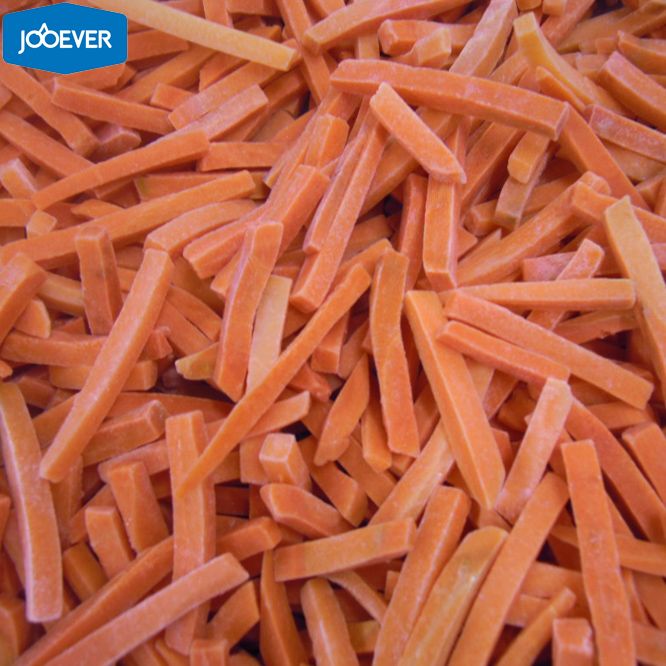Your reliable partner for frozen foods
Carrots are one of the most widely consumed vegetables in the world. Known for their natural sweetness, vibrant color, and crisp texture, they are a favorite ingredient in salads, soups, and side dishes. Beyond their taste, carrots are also packed with nutrients that support good health. Whether eaten raw, cooked, or as frozen carrots, they are a convenient and nutritious choice for people of all ages.
Carrots are rich in essential nutrients such as beta-carotene, fiber, vitamin K1, potassium, and antioxidants, while being low in calories and fat. A 100-gram serving of carrots contains only about 41 calories, yet provides a powerful mix of vitamins and minerals.
The bright orange color of carrots comes from beta-carotene, a natural compound that the body converts into vitamin A. This vitamin plays a vital role in maintaining good vision, a healthy immune system, and proper growth. In addition, carrots provide dietary fiber that supports digestion and helps control cholesterol levels.
It’s worth noting that frozen carrots maintain almost all the nutritional value of fresh ones. Modern quick-freezing technology locks in freshness, color, and nutrients, making frozen carrots a practical way to enjoy their health benefits anytime of the year.

When people think of carrots, eye health is often the first benefit that comes to mind—and for good reason. Carrots are among the best sources of beta-carotene, which the body converts into vitamin A. This nutrient is essential for good vision and helps prevent night blindness.
Besides beta-carotene, carrots contain other carotenoids such as lutein and zeaxanthin, which protect the eyes from harmful light and may reduce the risk of age-related macular degeneration. Including fresh or frozen carrots in your daily meals can help maintain clear, healthy vision over time.
Carrots are high in dietary fiber, which is essential for digestive health. The main type of soluble fiber found in carrots, called pectin, helps slow down sugar absorption, supports healthy digestion, and can lower blood cholesterol levels. By keeping digestion smooth and the gut balanced, carrots contribute to overall wellness.
Furthermore, the potassium in carrots helps regulate blood pressure and supports heart function. For people with busy lifestyles, frozen carrots are a convenient way to add fiber and potassium to daily meals without losing nutritional value. Whether added to soups, stews, or rice dishes, they help promote a strong heart and healthy digestion.
Carrots are also packed with vitamin C and antioxidants, which are essential for strengthening the immune system. Vitamin C helps the body fight infections and promotes wound healing. At the same time, antioxidants protect cells from damage caused by free radicals, reducing inflammation and the signs of aging.
Additionally, the biotin and vitamin A in carrots support healthy skin and hair. These nutrients help maintain skin elasticity and natural glow, making carrots a simple but effective food for natural beauty. Frozen carrots are especially useful here—they can easily be added to everyday recipes, providing immune-boosting nutrients all year round.
Research has shown that diets rich in carotenoids—like those found in carrots—are linked to a reduced risk of chronic diseases, including certain cancers and heart conditions. Compounds such as polyacetylenes and anthocyanins found in carrots have antioxidant properties that may help protect cells from damage and support long-term health.
While these effects depend on a balanced diet overall, adding both fresh and frozen carrots to your meals contributes valuable antioxidants and nutrients that promote long-term wellness.
Carrots are naturally low in calories but high in fiber, making them a great choice for anyone trying to manage weight. Fiber helps increase fullness and reduce hunger, which can prevent overeating. Eating carrots as a snack or side dish can help lower calorie intake while still providing essential vitamins and minerals.
Because of their long shelf life and ease of use, frozen carrots are a perfect addition to healthy meal plans. They can be quickly steamed, stir-fried, or blended into soups and smoothies—making them ideal for busy households or commercial kitchens looking to offer nutritious meals efficiently.

While fresh carrots are widely available, frozen carrots offer important practical advantages. They are harvested at peak ripeness and frozen immediately to preserve their natural color, flavor, and nutrients. This ensures that consumers can enjoy high-quality carrots year-round without worrying about spoilage.
Frozen carrots also help reduce food waste since they can be stored for long periods without losing quality. For food businesses, restaurants, and wholesalers, this makes them a reliable ingredient that combines convenience with nutritional value.
Whether used in soups, stews, or mixed vegetable blends, frozen carrots deliver the same taste and benefits as fresh ones, supporting a healthy lifestyle with minimal effort.
Carrots are much more than a colorful vegetable on your plate—they are a rich source of vitamins, minerals, and antioxidants that promote better vision, heart health, digestion, and skin vitality. Their low calorie and high fiber content make them ideal for maintaining a healthy diet and managing weight.
With modern freezing technology, frozen carrots have become a convenient and equally nutritious option for both homes and food industries. They preserve the freshness and health benefits of carrots while offering longer storage and easier preparation.
At Jooever, we take pride in supplying high-quality frozen carrots and other nutritious frozen vegetables to global markets. As a trusted frozen vegetables supplier, we are committed to providing safe, healthy, and reliable products that help our partners deliver natural goodness to every meal.